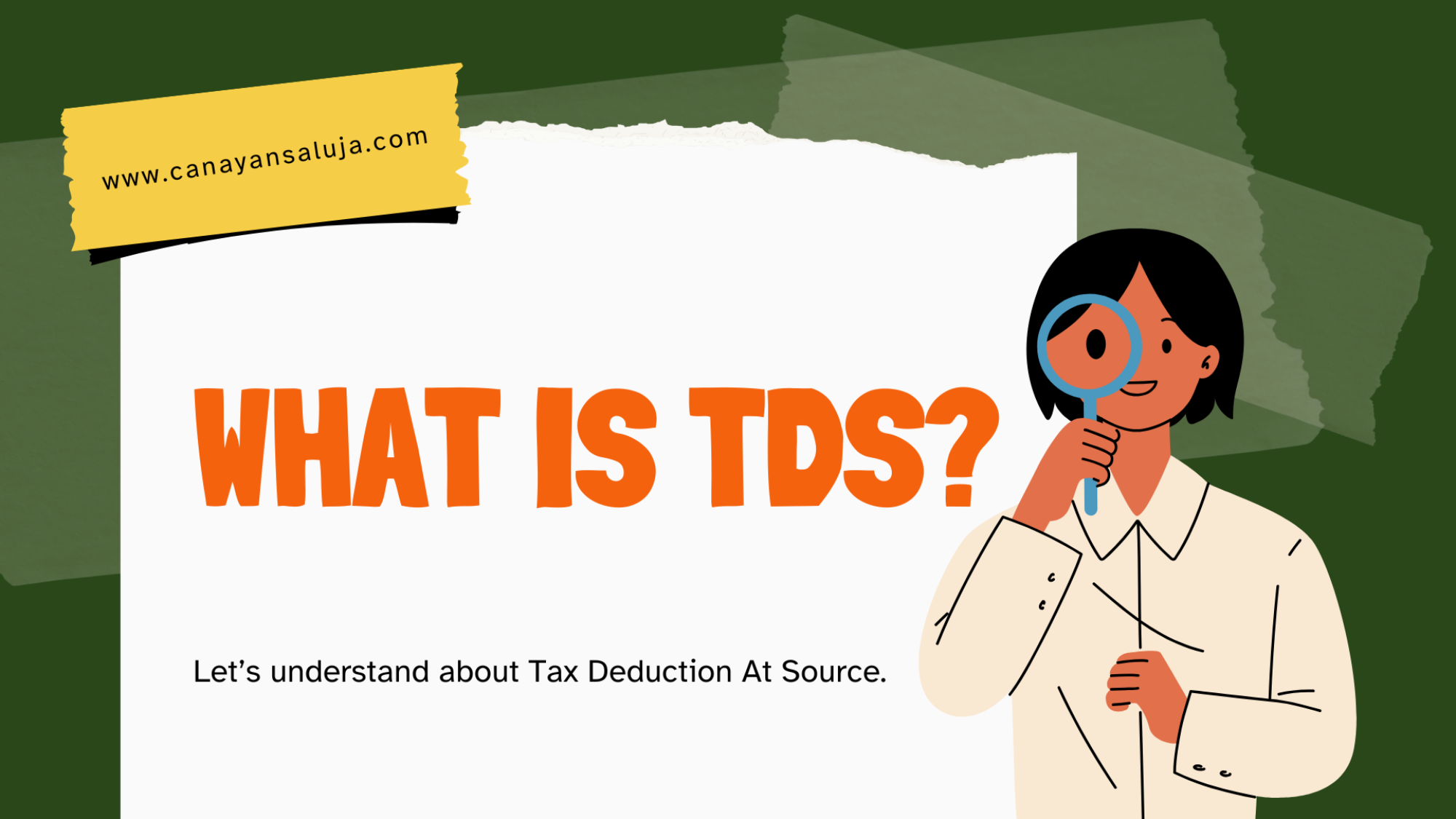- What do you mean by TDS?
TDS stands for Tax Deducted at Source. TDS is a kind of tax that is deducted by the payer before making certain payments like Salary, Rent, Commission, Interest, Royalty, Professional Fees etc. to the payee.
TDS is required to be deducted at the source if the money to be paid and the money already paid exceeds a specified amount.
The Payee can claim this tax deducted by the payer while paying his income tax liability for the year, and if the TDS deducted is more than the income tax liability of the assessee then he/ she will be entitled to a refund.
The main purpose of introduction of TDS was to reduce the Tax evasion by the person receiving the income.
Note: –
Payer- A payer is a person or organization who is responsible for deducting TDS before paying the amount to Payee.
Payee- A Payee is a person or organization who receives the payment from the payee after the TDS deduction.
2. When to deduct TDS?
TDS requirement arises:
- At the time of payment.
Or
- At the time of crediting the account of payee, whichever is earlier.
But in the following cases TDS is deducted only at the time of payments.
- Salary- Section 192.
- Employer Provident Fund (EPF) payment- Section 192A.
- Payment of Dividends- Section 194.
- Winnings from lotteries, crosswords, puzzles etc.- Section 194B.
- Winnings from Horse Races- Section 194BB.
- Winnings from Online Games- Section 194BA (at the time of withdrawal).
- Maturity proceeds of life insurance policy- Section 194DA.
- Compensation on compulsory acquisition of property- Section 194LA.
- Cash withdraw from bank, Co. op. banks, Post Office- Section 194N.
- Types of TDS and different rates?
There are more than 20 sections of TDS below are few examples of commonly used TDS rates: –
| Section | Type | Rate in force (%) |
| Section 192 | Salary Income | No specific rate on salary, TDS is to be deducted as per slab rate. |
| Section 194 | Dividend Income | 10 |
| Section 194 A | Interest income (other than security interest) | 10 |
| Section 194 C | Payment to contractor & sub- contractor | 1- Individuals/ HUF 2- Other assessess. |
| Section 194 D | Insurance commission | 5- Individuals/ HUF 10- Other assessess. |
| Section 194 G | Commission on sale of lottery tickets. | 10 |
| Section 194 H | Commission & Brokerage income | 5 |
| Section 194 DA | Maturity proceeds of life insurance | 5 |
| Section 194 I | Rent of P&M, Equipment’s, Building, Furniture & Land | 2- Plant, Machinery, Equipment’s 10- for others. |
| Section 194 IA | Transfer of moveable property other than rural agriculture land | 1 |
| Section 194 C | Payment for Professional service, Royalty, Remuneration to directors, Fees for technical service | 10 |
| Section 194 K | Income from UTI or Mutual Funds Units | 10 |
| Section 194 N | Cash withdrawn from Banks. Co. op. Banks, Post office | 2 |
| Section 194 O | Sale of Good/ Services on E-Commerce | 1 |
| Section 194Q | Purchase of goods | 0.1 |
All TDS rates are fixed rates i.e. 1%, 2%, 5%, 10% etc. but if payment is made to Non-Resident/ Foreign Company or payment of salary the surcharge & HEC (Health & Education Cess) shall be considered.
3. Due dates to deposit TDS?
The due date to deposit TDS is as Follows: –
| Month | Due Date |
| April | On or before 7th May. |
| May | On or before 7th June. |
| June | On or before 7th July. |
| July | On or before 7th August. |
| August | On or before 7th September. |
| September | On or before 7th October. |
| October | On or before 7th November. |
| November | On or before 7th December. |
| December | On or before 7th January. |
| January | On or before 7th February. |
| February | On or before 7th March. |
| March | On or before 30th April. |
4. What are the due dates of filing of TDS returns?
TDS is to be deposited monthly on the dates mentioned above but the return is to be filed quarterly on or before the below mentioned dates; –
| Quarter | Period | Due date (TDS filing) |
| 1St quarter | April-June | 31st July. |
| 2nd quarter | July-September | 31st October. |
| 3rd quarter | October- December | 31st January. |
| 4th quarter | January- March | 31st May. |
5. What happens if TDS is not deducted or deducted but not deposited on or before due date?
Following penalties will be levied if there is delay in TDS deduction or delay in deposit of TDS.
| Particulars | Penalty |
| TDS not deducted on time. | 1% per month or part of month. |
| TDS deducted but not deposited before due date | 1.5% per month or part of month. |
| TDS return not file on or before due date | 200 per day maximum till TDS amount. |
6. Different types of TDS returns?
Following are the TDS returns that are used for different purposes.
| Form | Used for |
| 24Q | TDS return for salary payment. |
| 26Q | TDs return for various payments excluding salaries |
| 26QB | TDS on sale of property. |
| 26QC | TDS for rent (individual paying rent more than Rs. 50,000 per month) |
7. What happens if Payee does not furnish his/ her PAN?
If payee does not furnish his/ her PAN to the payer, then the TDS rate shall be: –
- Rate as per respective section, OR
- Rate @ 20%
Whichever is higher.
For Section 194O/ 194Q rate is 5% instead of 20%.
Note: –
This section does not apply to Non- Resident or Foreign company not having PAN in respect of payment in the nature of interest, dividend, royalty, fees for technical services and payment of capital assets, if payee furnished the following details and documents to the payer: –
- Name, E-mail & Contact Number.
- Address in the country outside of INDIA of which payee is a resident.
- Certificate of his being resident of foreign country from government of that country.
- Tax identification number of payee in the foreign country, in case no such number is available then a unique number on the basis of which the payee is identified in foreign.



Add a Comment